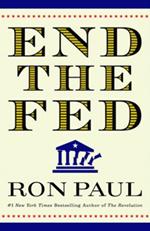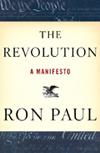My Conversation With Ben Bernanke, November 18, 2008
November 18, 2008
Oversight of Implementation of the Emergency Economic Stabilization Act of 2008 and of Government Lending and Insurance Facilities: Impact on the Economy and Credit Availability hearing before the Committee on Financial Services, U.S. House of Representatives, November 18, 2008
 The CHAIRMAN. The gentleman from Texas.
The CHAIRMAN. The gentleman from Texas.
Dr. PAUL. Thank you, Mr. Chairman. My question is directed to Chairman Bernanke. You know, for many years, the Austrian free market economists have predicted all these problems would come, and they were certainly correct in everything that they said. Of course, they are not very satisfied, including myself, with the so-called solutions, because it looks like we are spending a lot of energy and a lot of money trying to patch a system together that is unworkable. So we have Congress spending a lot of money; we have Treasury very much involved in trying to pick and choose which worthless asset that we are going to buy. And, of course, the Federal Reserve is involved in injecting trillions of dollars that nobody seems to be keeping track of. But what we are failing to do, I think, is to recognize that the system no longer works. But I can understand why we do this. Because, you know, if Congress couldn’t do this and if the Fed couldn’t do this and the Treasury couldn’t do this, it would make us all irrelevant. And instead of looking at the causes of this and then realizing that the solutions aren’t going to be found here, we have to make ourselves feel pretty important. But I think there is another reason why we think we are pretty important. It is because, in a way, our interference in the market corrections that tried to come about since 1971 seemed to work. I mean, the failure started in 1971 with a system that had no way of automatically correcting the balance of payment in the current account deficits. And that is where the problem has been. The economists, whether they were left, right, or middle over the last several decades, have always said this current account deficit is a big problem. Now it is totally out of hand. So here we are, struggling with all these rules and shifting back and forth and really getting nowhere. But my question is: When we come to the full realization that the system is unworkable, what are we going to do? What have you thought about doing? Already we see talk in the newspapers, we see articles about a new international world reserve currency. And, to me, that is pretty important, because the fiat dollar reserve system is not going to work anymore. And that is the information that we have to accept and decide what we are going to do with in the future. This is not new in history. Currencies have failed, financial systems have failed. And, generally, to restore the confidence that everybody is talking about, they usually have to go back to a currency with integrity to it rather than just fiat money. And, you know, the stage is there; it is not impossible. Already the central banks of the world still own 15 percent of all the gold that was ever mined in all of history. So they hold on to this gold for some reason. And, therefore, something has to give, or are we going to keep trying to waste more money and time patching this system together? Just last week, there was a report that Iran purchased $75 billion worth of gold, took their reserves out of Europe, bought gold, and put it in Asia. So is that a sign of the times, and is that moving on? Now, my question is, in your meetings, and you had a meeting just recently with other central bankers, does this thought come up, about a new international world reserve currency? And, if so, does the subject of gold ever come up? How do you restore the confidence? Have you recently had conversation with any central banker? And is there a move on to replace the dollar system? Because the dollar system is essentially declared dead because it is not working. But this, indeed, was predictable because of these tremendous imbalances that were never allowed to be corrected, and they were always patched up. We always came in. We would spend, we would inflate, we would run up deficits. And, since 1971, we have been able to correct these problems. Could you tell me what kind of conversations you have had regarding a new reserve currency?
Mr. BERNANKE. Yes, Congressman. I don’t think the dollar system is dead. I think the dollar remains the premier international currency. We have seen a good bit of appreciation in the dollar recently during the crisis precisely because there has been a lot of interest in the safe haven and the liquidity of dollar markets. And the Federal Reserve has been engaged in swap agreements to make sure there is enough dollar liquidity in other countries because the need for dollars is so strong. So I think the dollar system remains quite strong. I do agree with you very much on one point, which is about the current accounts. The current account imbalances have proven to be a very serious problem. It was, in fact, the large capital inflows from those current accounts which created a lot of the financial imbalances we saw and have led to some of the problems we are seeing. And one of the silver linings in this huge great cloud is that we are seeing some improvement in greater balance in our current account deficits.
Dr. PAUL. But does the subject of a new regime ever come up?
Mr. BERNANKE. No, it doesn’t.
Dr. PAUL. And does the subject of gold ever come up in any of your conversations?
Mr. BERNANKE. Only in terms of the sales that the central banks are planning.
Dr. Ron Paul is a Republican member of Congress from Texas.







